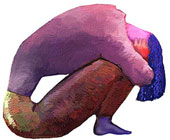Thoughts of revenge karma are so sweet! Especially when you have suffered at the hands of a loved one and have to suck it up. Imagining that the perpetrator will get their comeuppance one day offers some comfort. Revenge karma involves a belief that there is a higher power that knows who is good and who is bad, keeps score, rewards the former and punishes the latter. Revenge karma provides interim satisfaction that this higher force or God like entity will pick just the right moment to take down the offender at the height of their success to exert maximum damage and avenge your pain.
Revenge Karma– in couples dealing with infidelity and betrayal
At the age of 37 Bethany was enjoying the life she had dreamed of. A husband, kids, and a good suburban community life – until she discovered her husband was cheating. She divorced him and was bitter for years, not so much about the infidelity, but about the fact that he remarried, started a new family in a new house, kept that new family, taking her dream and having it with someone else.
Steeped in revenge karma, she waited, hoping that his new family and romantic life would sour. Surely the world would recognize the injustice and punish him. Why was he continuing to get the good breaks, while she had to reduce her life style? Why wasn’t her ex-husband being called to account, and bearing the consequences of his immoral actions? As she waited for revenge karma to vindicate her goodness, she fantasized about her role in meting out punishment, where she could wound him at his most vulnerable and get her revenge.
The Fantasy of Revenge Karma in Infidelity
Bethany’s personal lullaby at night was the fantasy that her ex-husband would be ruined and lose his new love. Then he would realize his mistake, regret cheating on Bethany and want to come back. He would discover how special she was and make it up to her. He’d put her back on a pedestal, praise her goodness and admit his foolishness. Just when he thought he had convinced her of his repentance she would refuse his pleas, crush him, and feel fully avenged.
Personality Features of Revenge Karma
Research evidence reveals that a deep sense of injustice and righteousness often play out in couple relationships.
In their book “The Dark Triad and Revenge in Couple Relationships: A Dual-Process Model,” Michael W. Watson, Stephen D. L. Paulhus, and Ingeborg M. Valkenburg (2014) propose that partners who indulge in revenge karma are likely to have an underlying set of traits that make vengeful acts more likely. These include elements of narcissism, cunning, and manipulation with little regard for the other because they own the only legitimate cause. Bethany acted out these aspects of herself in her fantasies, waiting for the moment when revenge karma would make come true.
Revenge Karma is an Updated Tool From Childhood Betrayal and Neglect
As a very young child Bethany never knew if or when her parents would want to enjoy her, and feared being inadequate. She was terrified that they would find something more lovable and cute than her. Her psychic self was in a constant state of existential crisis.
At bed time, she went to sleep hugging a special stuffed toy, afraid that sleep would permanently separate her from her parents. They wouldn’t miss her because they were so into each other. Cut off from them she would have a psychic death.
The Precursor to the Belief in Revenge Karma
So Bethany’s psyche devised a way to survive. She imagined ways in which she could become the valued and sought after attraction to her parents. She was going to be a good girl. She would be quiet, suffer in silence and withdraw. Maybe she would die in her sleep, or she might get sick and die or run away from home. Then her parents would miss her, realize their neglect of their most precious possession, and promise never to hurt her again. This was the precursor for her later revenge karma. Her entitlement to have their attuned and joyous attention was appropriate for infant and toddler Bethany.
The reality of not being able to impact her parents despite her efforts to be perfect, brought shame and a deep sense of injustice. Having to parent herself in these most basic ways set up a kind of narcissism that she needed to keep going.
Predictably, her parents not only didn’t reward her for her goodness, but didn’t even notice it.
Revenge Karma Solidifies in Young Adulthood
If her parents didn’t notice and value her goodness, then surely her romantic partner would. So in her early adulthood Bethany shifted her focus to being the perfect wife and mother. She started on that journey by offering herself as someone who would be a good loyal and dependable caretaker (a mirror image of what she longed for). She found a partner who was very needy and swept him up in her caring embrace. A co-dependent relationship was set up. She made sure he depended on her by taking care of everything he needed, and he took care of her by focusing on her and her alone. A dependent husband is a good insurance policy against betrayal, abandonment and neglect. Her scheme fell apart when her husband outgrew the dependency and found another relationship. The co-dependency was broken, and hell hath no fury like the partner who hasn’t grown. Bethany’s rage stirred the revenge karma. Surely this time her unwavering belief and loyalty in this belief system would show itself.
The Tragedy of Failed Revenge Karma
Revenge karma didn’t do its job. Nothing bad happened to her ex-husband or his new family. Not only did the revenge karma fail her, there were no signs of revenge karma getting her justice as a child, after her divorce or years later when her ex-husband was still doing well. Bethany felt that she was being punished instead of him, having to live alone, steeped in envy and hatred because the bad guy wasn’t getting his just desserts.
Bethany lost trust in romantic relationships and set out to prove she was right by dating men she didn’t like or that let her down. It became self-fulfilling prophecy.
Stephanie D. Boon and Victor L. Deveau in their article, ‘Beyond Distrust: Getting Even’ and the Need for Revenge by (2012) suggested that revenge is often a response to feelings of betrayal, which can erode trust and damage the relationship. They also find that individuals who are more likely to distrust others are also more likely to engage in vengeful behavior. Bethany lost all trust in men. Gripped by her revenge karma she couldn’t allow herself to form relationships with other men. She didn’t trust them, as that made her feel she was minimizing her pain. To do so would be to forgive the unforgiveable and undeserved betrayal by her ex-husband.
The Descent into An Martyred Existence When Revenge Karma fails
As her hopes of revenge karma were shattered, Bethany went through all the stages of grief, jumping from denial to anger to depression and got stuck at accepting that life isn’t fair, and good doesn’t necessarily prevail.
She descended into
• Shame – because her indulgence in the magical thinking that simply believing in revenge karma meant that it would, should and had to work.
• Self-defeat – reliving the helplessness and anger of her childhood when she had no power to get her parents to give her what was her due.
• Depression – because the world out there was not coming to her rescue by crushing her ex-husband, Bethany turned inward and began denigrating herself. In a masochistic way, she punished herself for her magical thinking about revenge karma.
• Martyrdom – her goodness had been rejected three times – first by her parent, then by her husband and lastly by her investment in revenge karma.
Recovering From the Magical Thinking of Revenge Karma
The road to recovery is very tough because it involves Bethany giving up her childhood wish and belief that there is a good fairy who looks after her at all times and can be depended upon to do so. It’s a huge shift to a reality that isn’t palatable. A sustainable recovery involves Bethany getting what she missed out on as young child. In a stable psychotherapeutic relationship she can get the attunement, and sense of being valued that would give her the courage and motivation to be in the world where justice has to be seen in various contexts. Including family of origin therapy in her work will help Bethany come to terms with reality in all its imperfect and flawed aspects.
Accepting that she can be ‘bad’ or ‘good’ and so much else in between, is the goal, including surrendering to the reality that she can’t force the world the way she wishes, just because she wishes it so.
Jeanette Raymond, Ph.D. 2023
You may also like:
What’s Your Style of Caring? Do You Care About, Care For or Care Throught Co-Dependency?
What Makes You Push Your Partner Away and Choose Depression and Loneliness ?




